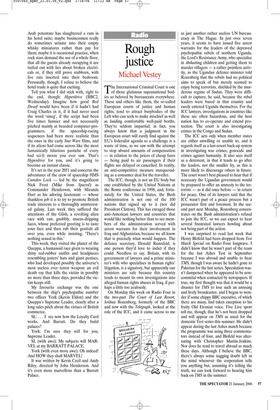Rough justice
Michael Vestey
The International Criminal Court is one of those glutinous supranational bodies so beloved by bureaucrats everywhere. These and others like them, the so-called European courts of justice and human rights, tend to attract busybodies of the Left who can seek to make mischief as well as landing comfortable well-paid berths. They’re seldom impartial; in fact, you always know that a judgment in the European court will rarely find against the EU’s federalist agenda so a challenge is a waste of time, as we saw with the attempt to stop absurd amounts of compensation — in relation to the prices of cheap fares — being paid to air passengers if their flights are delayed or cancelled. In reality, an anti-competitive measure masquerading as a consumer deal for the traveller.
The ICC, though, is not an EU body but one established by the United Nations at the Rome conference in 1998, and, fortunately for the United States, the Bush administration is not one of the 100 nations that signed up to it (nor did President Clinton). This has enraged those anti-American lawyers and countries that would like nothing better than to see members of the administration served with arrest warrants for their involvement in Iraq and Afghanistan, because we all know that is precisely what would happen. The defence secretary, Donald Rumsfeld, is one person they’d love to indict if they could. Needless to say, Britain, with its government of lawyers and a prime minister’s wife who specialises in human rights’ litigation, is a signatory, but apparently our ministers are safe because this country tends to mount its own investigations into alleged human rights abuses in Iraq, if perhaps a little too zealously.
On Monday this week on Radio Four in the two-part The Court of Last Resort, Joshua Rozenberg, formerly of the BBC and now with the Telegraph, looked at the role of the ICC, and it came across to me as just another rather useless UN bureaucracy in The Hague. In just over seven years, it seems to have issued five arrest warrants for the leaders of the depraved psychopathic rebels of northern Uganda, the Lord’s Resistance Army, who specialise in abducting children and getting them to murder villagers — a rather pointless activity, as the Ugandan defence minister told Rozenberg that the rebels had no political aims to speak of but merely seemed to enjoy being terrorists, shielded by the murderous regime of Sudan. They were difficult to capture, he said, because the rebel leaders were based in that country and rarely entered Uganda themselves. For the ICC lawyers, investigations in countries like these are often hazardous, and the host nation has to co-operate and extend protection. The court is also investigating crimes in the Congo and Sudan.
The ICC acts only when member states are either unwilling or unable to, and it regards itself as a last-resort back-up system in investigating war crimes, genocide and crimes against humanity. It also sees itself as a deterrent, in that it tends to go after the leaders, not the smaller fry, as this is more likely to discourage others in future. The court wasn’t best pleased to hear that if necessary the Ugandan government would be prepared to offer an amnesty to the terrorists — as it did once before — in return for peace. One of its lawyers said that the ICC wasn’t part of a peace process but a prosecutor first and foremost. In the second part next Monday, Rozenberg concentrates on the Bush administration’s refusal to join the ICC, so we can expect to hear several frustrated lawyers howling about not being part of the action.
I was surprised to read last week that Henry Blofeld had been dropped from Test Match Special on Radio Four longwave. I didn’t know that he wasn’t part of the team for the last Ashes Test in September because I was abroad and unable to hear TMS, though I was aware he hadn’t gone to Pakistan for the last series. Speculation wasn’t dampened when he appeared to be noncommital when contacted by newspapers. If true, my first thought was that it would be a disaster for TMS to lose such an amusing and lively broadcaster, and I began to wonder if some chippy BBC executive, of which there are many, had taken exception to his fruity Old Etonian voice. Five Live sport tell me, though, that he’s not been dropped and will appear on TMS as usual for the domestic Test series this summer. He didn’t appear during the last Ashes match because the programme was using three commentators instead of four, and Blofeld was alternating with Christopher Martin-Jenkins. Nor does he tend to travel abroad as much these days. Although I believe the BBC, there’s always some nagging doubt left in the mind whenever the corporation tells you anything but, assuming it’s telling the truth, we can look forward to hearing him back on TMS in the summer.



















































 Previous page
Previous page